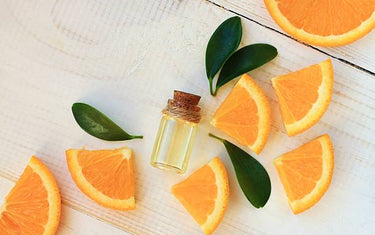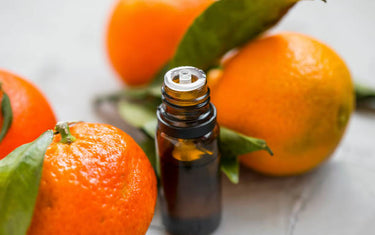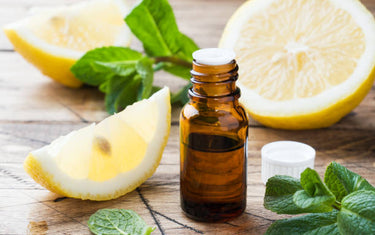8 min read / 12 November 2024 / yasmin sharp
10 Benefits and Uses of Orange Oil
Whether sweet or bitter, orange essential oil has tons of benefits for the body and mind.
Share this post

For centuries, oranges have been seen as a symbol of luck in various cultures.
China was the first country to officially discover how citrus oil could be extracted and used to treat certain ailments, although ancient myths and legends also alluded to the mystique of this vibrant fruit.
Its power as a medicinal extract sees it used to improve skin health, combat bacteria and reduce inflammation, with research into its natural properties unearthing new and exciting discoveries.
We'll explore several uses and properties of this citrus extract, including its effects on health and wellness.
What is orange oil?This extract comes in many different forms, as various iterations are derived from separate parts of the orange tree, native to China, and its similar species. For example, you will find that sweet orange, mandarin oil, orange blossom oil (also called neroli) and petitgrain (extracted from the leaves of the bitter orange tree) are just some of the types made available to buy. However, sweet orange (Citrus Sinensis) and bitter orange (Citrus Aurantium) are generally considered to be the most common form. These extracts are mid-to-light orange in colour and are cold pressed from the peel of the orange fruit, producing a similar sweet, citrusy scent. |
How does orange oil work?
It is believed that this substance contains a natural ability to boost immunity and reduce the symptoms of several ailments, including stress, acne and other health concerns.
When used topically, orange essential oil can help to improve the appearance, health and texture of skin, by promoting smoothness, radiance and clarity.
This can reduce the signs of ageing and ease the symptoms of certain skin conditions.
One of the main advantages in aromatherapy is the cheerful, uplifting scent that can work as both a mood booster and as a relaxant.
Its natural properties may also prove useful in eliminating airborne bacteria and strengthening the immune system.

What are the benefits of orange oil?
This extract may be useful to:
1. Combat germs and bacteria
The active ingredient of orange oil is limonene, which is commonly used in cleaning products. Scientific research into its antibacterial properties have also produced promising results.
For example, a study published in 2012 [1] found that E. coli contamination in foods could be prevented by using orange oil.
An earlier study [2] also concluded that the oil was able to inhibit the spread of salmonella.
It is said that these extracts are effective at repelling ants, a common pest that is attracted to food wastage.
By mixing the extract with distilled water in a glass spray bottle, you can try this method at home, spritzing the solution on shelves, surfaces and in other areas where ants might be attracted to.
2. Reduce inflammation and blood pressure
Research has found that this substance may be able to reduce systolic and diastolic blood pressure.
A 2014 study [3] concluded that compared to fresh air, when the oil was inhaled it offered protection against the damage caused by a spike in blood pressure.
And, according to some research, [4] sweet orange may be able to reduce the pain levels of patients with fractured limbs.
This is because the soothing properties work to turn off reactions that are responsible for causing swelling in muscular tissue.
As a result, this helps to prevent a negative reaction around injured joints and muscles, whilst soothing associated pain.
3. Lower anxiety levels
Orange essential oil is a popular choice in aromatherapy due to its calming properties, which can help to naturally reduce anxiety levels.
Some studies suggest it can help people feel more relaxed, including pregnant women worried about labour.
Adding a few drops to a diffuser is an easy way to enjoy its aromatherapeutic effects, whilst adding to warm bather water or burning a scented candle also works just as well.
4. Improve skin health
Whilst there are many different types of orange oil, most are considered bad for the skin due to their phototoxicity, which means you should only ever use sweet orange.
And even though you should only apply sweet orange to your skin in the evening to reduce the risk of skin damage, it still has a lot to offer.
Its cleansing properties can help to purify the skin, whilst also reducing the signs of ageing by increasing elasticity thanks to its ability to boost collagen production.
It could help to reduce the appearance of acne due to its soothing properties, which researchers discovered in a 2012 study [7] .
5. Inhibit cancer and oxidative stress
Some research suggests that compounds found in this extract may have potential health benefits, including effects on certain types of cells.
However, it is important to note that these studies were done in a test tube and not in the human body, so further research is needed.

6. Enhance exercise performance
Athletes – whether professional or amateur – are always looking at ways to improve and better performance levels.
Some scientific research has been published that suggests orange essential oil could play a role in improving lung function.
A small study found that athletes who inhaled the scent showed improved running times and lung function.
7. Promote weight loss
There are some suggestions that this extract may be able to promote weight loss, although research to date has only been conducted on animal subjects.
A small study found that athletes who inhaled the scent showed improved running times and lung function.
Elevated cortisol levels can cause food cravings, especially for salty, fatty and sweet foods, so inhaling this scent may be able to help with weight management.
8. Boost immunity levels
This extract is rich in vitamin C, which can not only be very beneficial for skin but also the immune system.
When your body receives vitamin C it helps to move white blood cells to the site of infection, helping to enhance the body's defence mechanisms.
While it may not cure a cold, it might help reduce its duration.
9. Encourage better sleep
Perhaps one of the lesser-known uses of orange oil is to encourage better sleep.
Many people diffuse it to help them relax and unwind, which could also be beneficial for those who struggle to close off their thoughts at night.
Some studies suggest it may help with sleep issues.
You can try this at home by diffusing it shortly before you go to bed at night to create a calming atmosphere that relaxes the mind, helping you to drift off without too much interruption.
10. Enhance oral health
The properties also mean it could possess the ability to fight bacterial growth, helping to protect teeth and gums from infections.
Some people mix the oil with water and salt to make their own mouthwash, which may be able to offer some relief from a sore throat.
Another option is to try coconut oil pulling by combining pure coconut oil with a dew drops of orange essential oil.
Simply swish around your mouth and spit the mixture out when finished, and this can help to prevent cavities and bad breath.

How to use this extract
As an aromatherapy aid
Many of its effects can be enjoyed through the practice of aromatherapy – which enables you to naturally inhale its properties.
One method is to simply inhale the scent directly from a bottle of orange essential oil.
Alternatively, you can add 5-7 drops to a diffuser or oil burner to experience its bright, mood-boosting scent.
As a soap or candle ingredient
Orange essential oil is a hugely popular ingredient for homemade soaps and candles.
You can find a host of fun candle and soap recipes in our Make At Home blog section, which will give you a few hints and tips on where and how to get started.
Historical background
Traditional Chinese medicine practitioners were the first to realise the potential of this extract, with records dating as far back as 2200 BC.
The Portuguese brought it to Europe at the start of the 16th century, before spreading across the Mediterranean, where people began to discover these properties from the fruit’s refreshing taste.
Oranges have also featured in ancient myths, including the story of Titan Atlas and Hercules, where the fruit was labelled a “golden apple”.
As one of the oldest cultivated fruits in the world, the demand for oranges and their extracts remain as strong as ever, as they are a delight to smell, taste and utilise for a variety of health reasons.

Frequently Asked Questions
What is the difference between sweet orange and bitter orange?
The main difference between sweet orange oil and bitter orange oil is that the latter is not recommended for use on skin as it is considered more phototoxic.
Whilst they are extracted from different species of the fruit, in terms of uses and health effects, there are a lot of similarities, such as boosting weight loss and athletic performance.
Can I use orange essential oil on my pets?
In general, it is better to not use any essential oils on cats, dogs or any other pets.
Some people believe that it is safe to use orange essential oil in moderation, but there is always the risk that it could be harmful to your pet’s health.
Is it safe to consume orange essential oil?
Ideally, you should avoid consuming orange essential oil.
This is due to the high concentration levels of the oil which could cause health complications if consumed in large amounts.
Using the oil as part of a mouthwash should be fine, although you should avoid swallowing the mixture after use.
References
[1] Annalisa Lucera et al. (2012) Food applications of natural antimicrobial compounds https://www.ncbi.nlm.nih.gov/pmc/articles/PMC3441195/
[2] C.A. O'Bryan et al. (2008) Orange Essential Oils Antimicrobial Activities against Salmonella spp. https://ift.onlinelibrary.wiley.com/doi/abs/10.1111/j.1750-3841.2008.00790.x
[3] B.-J. Park et al. (2014) Physiological effects of orange essential oil inhalation in humans https://www.jstor.org/stable/24586839
[4] Davood Hekmatpou et al. (2017) The Effect of Aromatherapy with the Essential Oil of Orange on Pain and Vital Signs of Patients with Fractured Limbs Admitted to the Emergency Ward: A Randomized Clinical Trial https://www.ncbi.nlm.nih.gov/pmc/articles/PMC5661347/
[5] Miho Igarashi et al. Effects of olfactory stimulation with rose and orange oil on prefrontal cortex activity https://pubmed.ncbi.nlm.nih.gov/25453523/
[6] Masoumeh Namazi et al. (2014) Aromatherapy With Citrus Aurantium Oil and Anxiety During the First Stage of Labor https://www.ncbi.nlm.nih.gov/pmc/articles/PMC4102991/
[7] Germán Matiz et al. (2012) Effectiveness of antimicrobial formulations for acne based on orange (Citrus sinensis) and sweet basil (Ocimum basilicum L) essential oils https://pubmed.ncbi.nlm.nih.gov/23235794/
[8] Kotamballi N Chidambara Murthy et al. (2012) D-limonene rich volatile oil from blood oranges inhibits angiogenesis, metastasis and cell death in human colon cancer cells https://pubmed.ncbi.nlm.nih.gov/22935404/
[9] Chao Yang et al. (2017) Antioxidant and Anticancer Activities of Essential Oil from Gannan Navel Orange Peel https://www.ncbi.nlm.nih.gov/pmc/articles/PMC6152265/
[10] Nidal Amin Jaradat et al. (2016) The effect of inhalation of Citrus sinensis flowers and Mentha spicata leave essential oils on lung function and exercise performance: a quasi-experimental uncontrolled before-and-after study https://www.ncbi.nlm.nih.gov/pmc/articles/PMC5034497/
[11] Dahu Li et al. (2019) Weight loss effect of sweet orange essential oil microcapsules on obese SD rats induced by high-fat diet https://pubmed.ncbi.nlm.nih.gov/30741117/
[12] Mehdi Jafarzadeh et al. (2013) Effect of aromatherapy with orange essential oil on salivary cortisol and pulse rate in children during dental treatment: A randomized controlled clinical trial https://www.ncbi.nlm.nih.gov/pmc/articles/PMC3732892/
[13] (2006 - ) Common colds: Does vitamin C keep you healthy? https://www.ncbi.nlm.nih.gov/books/NBK279544/
[14] Babar Ali et al. (2015) Essential oils used in aromatherapy: A systemic review https://www.sciencedirect.com/science/article/pii/S2221169115001033










